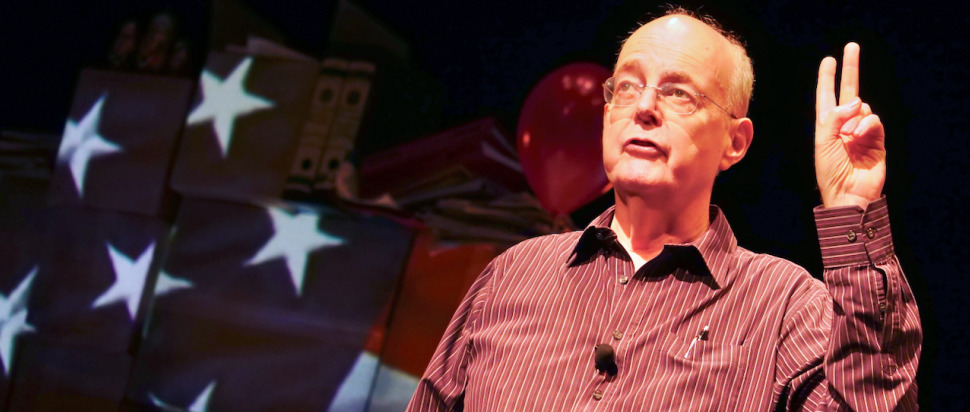David Edgar on his first solo show Trying It On
We chat to David Edgar about the 1960s, identity politics and catching up with his 20 year old self in new solo show Trying It On
I'm talking to the author of more than sixty published plays and one of the UK’s most prolific post-1960s dramatists. After 50 years of working at the forefront of British theatre as a writer, David Edgar’s treading the boards for the first time in his autobiographical solo show, Trying It On. The decision was catalysed by his 70th birthday last year – and I’m about to ask him the question I’m most nervous about.
“I’m a millennial, and our generation tends to vilify the older, white, successful man,” I say. “I suppose we feel that your demographic is responsible for most of society’s ills. Do you think every generation thinks it's more radical than the one before it?”
“Well, we were the same,” says Edgar. “In my generation… in the late 1960s, one of the key slogans was ‘don’t trust anyone over 30.’ Obviously, I’ve spent forty years in the over-thirty bracket. So who am I to talk?”
With Trying it On, Edgar has created a piece of work that sounds truly unique: in it, the current-day Edgar imagines a conversation with his 20-year-old self. At twenty, he was a fierce Marxist, involved in radical politics at the height of the counter-cultural revolution of the 1960s; the show sees him examine his former and current beliefs, reflect on what has changed politically and personally, and speculate as to whether his young, idealistic self would approve of his life choices. The intense self-appraisal doesn't gloss over questions of privilege – in a sense, 'who am I to talk?' is one of the themes of the play.
"I was 20 in 1968, bang in the middle of the worldwide student uprising, which was also about cultural, sexual and social relations," says Edgar. "Any of us who were excited about that at the time have seen parallels over the last five years – from Occupy, to the movement against student fees in this country, to the Arab Spring."
What's the biggest difference between radical politics now and then? Edgar cites technology as a distinction, and seems excited about its potential – "the Arab Spring was planned on Twitter and Facebook, and promoted on YouTube. That's very different to what was happening to those grainy pictures of Paris [in 1968]." But the most powerful difference, he says, is the focus on identity politics. "As a young socialist, I was convinced Marx and Engels got it right. Now I’d still be inclined towards Marx, but there’s no doubt that the model has been severely contradicted by history,” he says. “The rise of intersectionality... shows [that] there are other, exciting ways of thinking about how you pursue policies that meet the undoubted need to liberate people from oppression."
Edgar is more than positive about the future of theatre, too. He says the National Theatre's new season, staging work predominantly by female writers, is "terrific"; and that we have more young writers "who are really good at their craft" then ever before. It's refreshing to hear an established activist and playwright express faith in the next generation, who hold the world in their hands. Hopefully, his younger self isn’t too hard on him.
Trying It On, Traverse Theatre (Traverse 1), various times, 28 Jul - 25 Aug, £5-22
